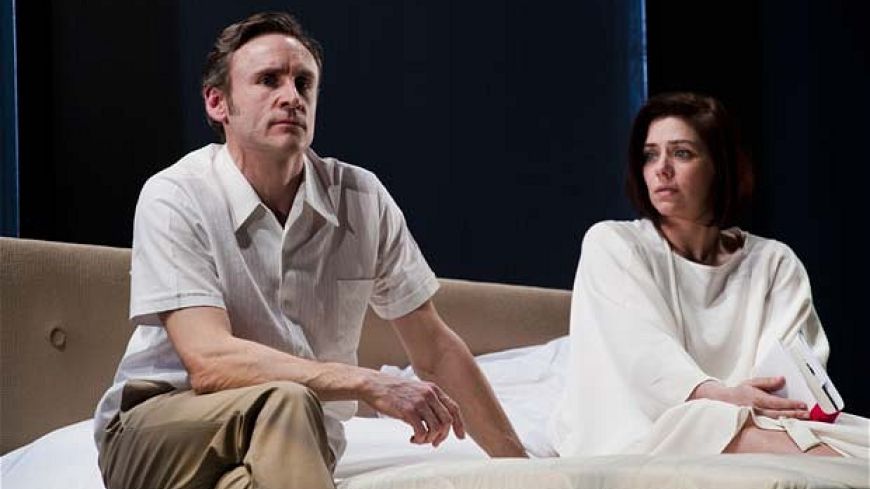
Before the action begins, the empty Citizens theatre stage has a pile of furniture stacked at the back wall. Then slowly, each scene is meticulously furnished, with sliding panels indicating the time period, with selected chairs, table or bed put in place.
This ingenious one act play about marriage, manners and morals draws us into the whys and wherefores of an extra-marital love affair. This is dramatised backwards through the preceding nine years. (Think of a kind of re-worked “When Harry met Sally”, but in reverse). The narrative is partly autobiographical, based on Pinter's real life affair with TV presenter Joan Bakewell.
We first meet Emma and Jerry over a drink in a bar, having a stilted conversation. It is 1977, two years after their adulterous relationship has ended. Scene by scene we move back in time, to observe their complex love triangle - Emma, her husband Robert, a book publisher, and his best friend Jerry, a literary agent.
As we journey from present to past, the audience knows more than the characters about the turn of events soon to unfold. The precise language, short, snappy, small talk, is rich in meaning as we recognise barefaced lies, subtle questioning and quiet deception. The conversation is slim, yet it implies so much.
There are numerous awkward moments as they try to avoid revealing the truth, where every pause is significant. "Pinteresque" has entered the vocabulary to mean a dialogue of evasion. Here, Emma, Robert and Jerry rarely say what they mean, what they're feeling, or what they're thinking.
The revolving stage neatly reflects the passage of time, each scene creating a sense of place – a hotel in Venice, Jerry and Emma’s flat, Robert and Emma’s home, bars and restaurants.
An exceptionally dynamic episode is over a business lunch where Robert - deftly played by Cal Macaninch with simmering anger held in place with brittle, brusque control - discusses literary fiction and new writers with Jerry, whose boyish personality is portrayed with laid back charm by Hywel Simons.
Robert knows about his wife’s affair, but reveals nothing. He cracks jokes, describes his visit to Torcello by water taxi, all the while pretending that Jerry is his trusted best mate and colleague.
But beneath the words he feels bitter and betrayed, as he plays his own cool and calculating game of double ambiguity. “You must come over to the house, Jerry, ” he adds with veiled sarcasm, “Emma would love to see you.”
The three actors have to fine tune their skills to express the changes in age, experience and relationship with each other. In the centre, caught between both men, Emma, performed with feminine grace and guile by Neve McIntosh, gradually loses the layers of hidden guilt, to become younger, carefree, innocent.
This welcome revival of Pinter’s intelligent, intimate drama is crisply directed by Dominic Hill. The time travel structure makes the emotional impact of the final scenes even more poignant: the deconstruction of this quietly revealing, gentle, genteel love story certainly packs a punch.
Showtimes
2 - 24 March, 2012

